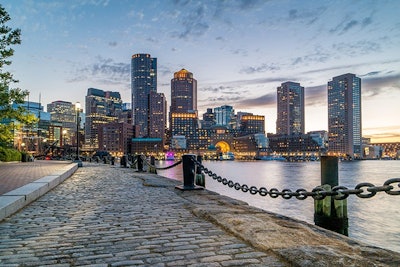
Adult-use cannabis business licensing began on April 2 in Massachusetts, and municipalities hold a substantial amount of power in deciding who will ultimately become licensed, according to Jesse Alderman, co-chair of Foley Hoag’s cannabis practice.
“Where these licenses are trench warfare in terms of competition is at the municipal level in terms of winning local zoning approvals because many municipalities have banned recreational cannabis, as they’re allowed to do,” Alderman says. “Many more are still contemplating where and how they will zone for recreational cannabis facilities, and there’s a precious few communities … [such as] Boston, Worcester, Salem and many smaller communities [that] have put forward zoning and have begun their process, but it’s incredibly competitive. It’s a process that the municipalities are taking very slowly and carefully at the zoning level.”
Massachusetts’ adult-use statute mandates that any medical or adult-use cannabis operator sign a “Host Community Agreement” with the municipality in which it operates. These agreements can include annual payments by the cannabis businesses of up to three percent of gross revenue, as well as additional incentives like contributions to charity or payment for police details, Alderman says.
“The cities and towns hold so much power in deciding when and to whom to give these Host Community Agreements,” he says. “The whole ballgame is at the municipal level in Massachusetts as I see it.”
To receive one of these coveted Host Community Agreements, Alderman says, a cannabis business needs zoning approval and a discretionary permit from the municipality. This often requires the operator to go before a deliberative body, such as a city council or zoning board. Some municipalities have additional requirements, such as board of health inspections, which would occur either right before or right after a business opens.
RELATED: Cannabis Businesses Face East Coast Zoning Headaches
“And then the end-all and be-all of this entire process would be the Host Community Agreement, and that’s typically negotiated with the mayor or city council or board of selectmen, depending on the form of government,” Alderman says.
The state, on the other hand, does not have a competitive licensing scheme or cap on the number of adult-use licenses that will be issued, and simply requires applicants to complete a uniform application. Applicants must disclose all individuals with equity, operational or management interest in the license and satisfy the requirements of financial and background investigations. They must also offer a preliminary explanation of operations and security plans, Alderman says.
“Essentially, [this is] a preliminary showing of a well-thought out ability to comply with the various operational regulations of the Cannabis Control Commission,” he says.
The commission’s licensing scheme also has a social justice component, so applicants must demonstrate diversity in hiring and operations, as well as plans to positively impact communities that have been disproportionately impacted by cannabis-related arrests.
“For instance, an applicant we work with has a really successful program where they recruit from an inner-city community college, and things like that are asked and have to be demonstrated in state licensing,” Alderman says.
When an application is completed to the satisfaction of the Cannabis Control Commission, the applicant is awarded a provisional license, which is then subject to an architectural-, health- and security-related inspection by compliance staffers. After a successful inspection, the business is granted a final license, and so far, no final adult-use licenses have been issued in the state, Alderman says.
Recreational sales were originally expected to launch July 1, but businesses continue to slog through the licensing process with no clear start date in sight. The first adult-use license for an independent testing lab was granted just last month.
“There is no indication of [a launch date] from the Cannabis Control Commission as I understand it, … either formally or informally,” Alderman says, but with the commission’s recent hiring of inspectors, he is hopeful that some final inspections will take place and final licenses will start to be issued soon.
Overall, businesses embarking on the licensing journey in Massachusetts should first and foremost find a location, Alderman says.
“Find great sites that work with the character of the community,” he says. “Reach out early and often to the municipality, and make sure they are comfortable with you, you are comfortable with them and there’s an ongoing dialogue. … [Ensure] that where and how you propose to operate your business is something palatable to them, and work through that local zoning and that Host Community Agreement. It all happens at the municipal level.”
Eventually, Alderman hopes that some level of transparency will be brought to the Host Community Agreement process. While some municipalities—such as Salem and Worcester—have created a uniform application process and established specialized committees to determine who should receive Host Community Agreements based on a variety of factors like location, compatibility of the neighborhood, diversity programs and the ability to succeed, others have not yet taken this leap.
“I would say that transparency with the Host Community Agreement process is one area where we could see some improvement, and I believe we will as municipalities wrap their head around this issue,” Alderman says.
And as more municipalities zone for cannabis businesses, competition may abate, he adds. “This will probably never be the same as opening a coffee shop, but it will start to resemble opening a normal commercial business, … but still heavily scrutinized.”
Top Image: © iuliia_n | Adobe Stock


























